
The Independent Voice for Conservative Values and the Conscience of the Conservative Movement Less Government is the Best Government |
||||
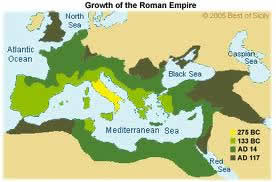
From Caesar’s Death to Jesus’ Birth
By Scott Rohter, July 2012
Alexander the Great, Ptolemy, Julius Caesar, Brutus, Antony and Cleopatra, and Caesar Augustus all had something in common. They all lived during a very brief period of time before the birth of Jesus Christ. So many things happened during those tumultuous years between the death of Julius Caesar in 44B.C. and the birth of Jesus Christ roughly 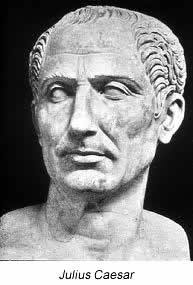 around 4 B.C. Almost no other time in history is quite as significant. So many world changing events that altered the course of history unfolded during those critical years between the murder of Rome’s first Caesar, and the birth of the world’s one and only Savior. So much of human history was determined between that royal assassination and the very humble birth of God’s only true Son who was born in a little manger, to a young Jewish woman in a dusty little town, in a very remote corner of the far-flung Roman Empire.
around 4 B.C. Almost no other time in history is quite as significant. So many world changing events that altered the course of history unfolded during those critical years between the murder of Rome’s first Caesar, and the birth of the world’s one and only Savior. So much of human history was determined between that royal assassination and the very humble birth of God’s only true Son who was born in a little manger, to a young Jewish woman in a dusty little town, in a very remote corner of the far-flung Roman Empire.
It was such a pivotal time in human history... such a critical time in the development of not western civilization. In just a little less than forty years, within a single generation, the span of one man’s lifetime, Julius Caesar was murdered, and Rome was plunged into a long civil war, a war which lasted for over ten years, and one which took Rome very far from its Republican moorings. This long struggle for control of the empire became a very personal fight to the finish between two military strongmen, both former allies of Julius Cesar. One was Caesar’s friend and military commander Mark Antony, and the other was Caesar’s nephew Octavian.
Mark Antony quickly formed a strategic alliance with the mother of one of Julius Caesar’s sons and heir apparent. She was the Queen of Egypt, Queen Cleopatra. She was actually Cleopatra VII to be exact. The name Cleopatra was actually the name of a dynasty of Egyptian Queens, just like the name Caesar applied to more than one Roman Emperor. This particular Cleopatra, the one who Mark Antony fell in love with, was actually the last Cleopatra to rule Egypt. She was also the last in a long line of descendants of one of Alexander the Great’s most important generals. His name was Ptolemy. Cleopatra VII was the last of the Ptolemys to rule over the land of the Nile. With her death by suicide in 30 B.C., the rule of Egypt by the descendants of Alexander the Great's General Ptolemy came to an abrupt end. Cleopatra VII was the last in a long  line of Macedonian rulers who were placed upon the throne of Egypt after Alexander‘s death and after his armies had defeated the Persians.
line of Macedonian rulers who were placed upon the throne of Egypt after Alexander‘s death and after his armies had defeated the Persians.
Young Alexander the Great’s death was swift and unexpected. He left no specific instructions as to how his vast territories were to be administered. Ptolemy was one of Alexander’s most influential generals. He seized Egypt for himself. At the same time he honored Alexander’s plans to build a great new capitol city for Egypt on the shores of the Mediterranean Sea, and he named that city after the leader he served. So Ptolemy finished building the city that Alexander had started. He built it on a grand scale to become the finest city of its day, and he named it Alexandria. Today it is still called in Arabic El Iskandaria, the City of Alexander.
Ptolemy started a dynasty of Greek-Macedonian rulers who would go on to rule Egypt for over three hundred years. This dynasty culminated with the death by suicide of Cleopatra VII in 30 B.C. This was the same Cleopatra who made a strategic alliance with Julius Caesar’s friend and general, Mark Antony. He later went on to become the father of three of her four children.
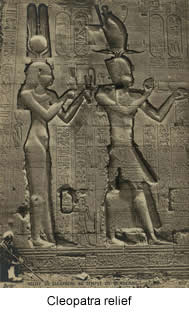 Here is a little more background about the last Cleopatra. She was the daughter of Ptolemy XI. After a bitter family rivalry broke out during her early reign into a full-fledged internecine struggle for power between her and the Egyptian forces aligned with her younger brother, Julius Caesar had to have her restored to the Egyptian throne and to her queenly status as the Pharaoh of Egypt. But for two years between 46 B.C. and 44 B.C. Cleopatra lived with Julius Caesar in Rome where she bore him a son. This child of Ceasar and Cleopatra alienated the Roman people who didn't want any child of Cleopatra ever ruling over Rome. After Julius Caesar’s death in 44 B.C. Cleopatra returned to Egypt where she had her own brother put to death in order that her son by Julius Caesar could be joint ruler of Egypt with her.
Here is a little more background about the last Cleopatra. She was the daughter of Ptolemy XI. After a bitter family rivalry broke out during her early reign into a full-fledged internecine struggle for power between her and the Egyptian forces aligned with her younger brother, Julius Caesar had to have her restored to the Egyptian throne and to her queenly status as the Pharaoh of Egypt. But for two years between 46 B.C. and 44 B.C. Cleopatra lived with Julius Caesar in Rome where she bore him a son. This child of Ceasar and Cleopatra alienated the Roman people who didn't want any child of Cleopatra ever ruling over Rome. After Julius Caesar’s death in 44 B.C. Cleopatra returned to Egypt where she had her own brother put to death in order that her son by Julius Caesar could be joint ruler of Egypt with her.
Just two years later in 42 B.C. Cleopatra met Mark Antony in Tarsus of all places, which is in present day Turkey. Tarsus was the birthplace of the Apostle Paul who is credited with writing much of the New Testament which changed the entire world. He was also the driving factor in leading the early Church. Paul was born in Tarsus only a mere twenty or thirty years after that fateful first meeting between Cleopatra and Mark Antony.
Mark Antony immediately fell in love with the very persuasive Egyptian Queen and together they formed a strategic alliance. She was still the mother of Caesar’s heir apparent, and he was Caesar’s very ambitious friend and best military commander. Together they hoped to defeat the combined forces of Octavian, (Caesar’s nephew) and to jointly rule Rome. Anthony needed Egypt’s help in order to do this. Egypt furnished his army with ships and grain to feed his soldiers and money to pay them. In return Cleopatra wanted a stronger role for Egypt in the re-organized Roman Empire. Her long term goal was exactly the same as it always had been. She wanted to jointly rule Rome one day as Mark Antony’s Queen, just the same way she had hoped to do as Julius Caesar's Queen before his murder. To make matters even more complicated Marc Antony was already married to Octavian’s sister whom he left to be with Cleopatra!
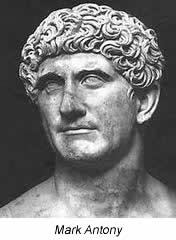 It was the shrewd and ambitious Cleopatra who turned Mark Antony’s eyes and heart away from his wife, and lured him to leave her. Octavia was the sister of Octavian, the man who would eventually rule Rome one day, but who was then locked in a death struggle with Mark Antony over Rome’s future! The abandonment of his sister did nothing to reduce the animosity or calm the tensions that already existed between these two fierce rivals, Octavian and Antony. The tensions culminated in the battle of Actium in 31 B.C. with the complete military defeat of the forces that were aligned with Antony and Cleopatra along the western coast of Greece.
It was the shrewd and ambitious Cleopatra who turned Mark Antony’s eyes and heart away from his wife, and lured him to leave her. Octavia was the sister of Octavian, the man who would eventually rule Rome one day, but who was then locked in a death struggle with Mark Antony over Rome’s future! The abandonment of his sister did nothing to reduce the animosity or calm the tensions that already existed between these two fierce rivals, Octavian and Antony. The tensions culminated in the battle of Actium in 31 B.C. with the complete military defeat of the forces that were aligned with Antony and Cleopatra along the western coast of Greece.
Later, after hearing rumors that were deliberately spread by his beloved Cleopatra of her death, Mark Antony took his own life by the sword before the advancing legions of Roman soldiers led by Octavian. However just before he died, he learned in fact that Cleopatra was still alive, and he asked to be taken to her where it is said that he died in her arms.
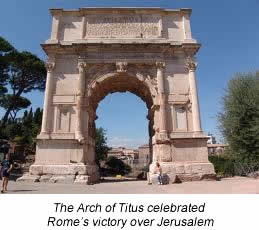 Now with Mark Antony gone and conveniently out of the way, the wiley Cleopatra sought to entice the victorious Octavian by offering herself to him, just the same way she had done with Julius Caesar and Mark Antony before him. She tried to use her considerable royal charm to forge an alliance with Caesar’s triumphant heir, but it was all to no avail, and rather than be humiliated before her enemies, she decided to really commit suicide this time before Octavian’s advancing armies could get to her. This was about ten days after Mark Antony had taken his own life.
Now with Mark Antony gone and conveniently out of the way, the wiley Cleopatra sought to entice the victorious Octavian by offering herself to him, just the same way she had done with Julius Caesar and Mark Antony before him. She tried to use her considerable royal charm to forge an alliance with Caesar’s triumphant heir, but it was all to no avail, and rather than be humiliated before her enemies, she decided to really commit suicide this time before Octavian’s advancing armies could get to her. This was about ten days after Mark Antony had taken his own life.
When Octavian finally entered the royal Egyptian city and the royal quarters in August of 30 B.C. he found they had both committed suicide, one by the sword and the other by poisoning about ten days apart. The last Queen Pharaoh of Egypt and the last of the Ptolemys to rule was only 39 years old at the time of her death by poisoning. This was in the year 30 B.C., only a mere twenty five years before the birth of Jesus Christ in a little Jewish town in the far away Roman province of Judea.
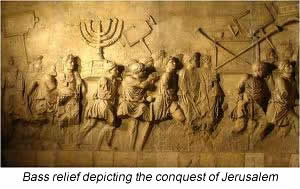 The tumultuous events of those forty years between 44 B.C. and 4 B.C. when Jesus was born in little Bethlehem of Judea , which the Bible mentions was the smallest of Jewish towns, not to mention the smallest of Roman towns, set the stage for even greater cataclysmic upheavals during the next seventy years! Jesus would be crucified, one of the world’s great faiths which is Christianity was born, the ancient Jewish Kingdom was destroyed in 70 A.D. by Roman Legions under the command of the Emperor Titus, and the surviving Jewish inhabitants would be scattered all over the known world. In the absence of any significant numbers of Jews in the Middle East the world stage was set for the spread of another great religion, Islam.
The tumultuous events of those forty years between 44 B.C. and 4 B.C. when Jesus was born in little Bethlehem of Judea , which the Bible mentions was the smallest of Jewish towns, not to mention the smallest of Roman towns, set the stage for even greater cataclysmic upheavals during the next seventy years! Jesus would be crucified, one of the world’s great faiths which is Christianity was born, the ancient Jewish Kingdom was destroyed in 70 A.D. by Roman Legions under the command of the Emperor Titus, and the surviving Jewish inhabitants would be scattered all over the known world. In the absence of any significant numbers of Jews in the Middle East the world stage was set for the spread of another great religion, Islam.
The expulsion of the Jews from their homeland in 70 A.D. resulted in a worldwide Diaspora of millions of displaced people and set the conditions in the world for the following huge scale events.
- The Spanish Inquisition in the 15th Century and the confiscation of Jewish wealth by King Ferdinand and Queen Isabella of Spain which prepared the financial way to finance the voyages of Christopher Columbus and the discovery of America.
- The subsequent maritime completion between England and Spain for supremacy of the high seas which led to the far flung British Empire.
- The Nazi Holocaust.
- The centuries long hostility that has always existed between Islam and the other two Abrahamic faiths which has resulted in the current War on Terror.
The origin of all of these events can be traced in part to the events that occurred between about 4 B.C. and 70 A.D.
"The truth, the political truth, and nothing but the political truth. A journalist has no better friend than the truth." - Scott Rohter |
 |
© Scott Rohter, Less Gov is the Best Gov .com. All rights reserved.